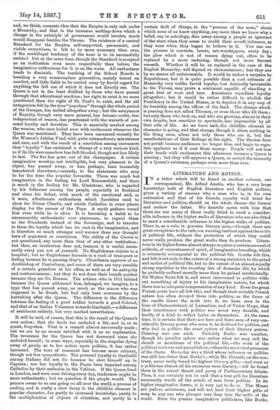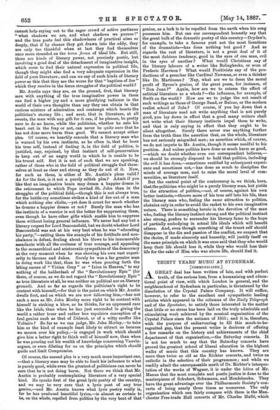LITERATURE AND ACTION.
IN a letter which will be found in another column, our correspondent, Mr. Alfred Austin, who has a very large knowledge both of English literature and English politics, gives a variety of reasons why a man who is, in his own estimation and that of his friends, equally well fitted for literature and politics, should on the whole choose the former and eschew the latter. We heartily agree with him that there are not many of those really fitted to exert a consider- able influence in the higher walks of literature who are also fitted to exert a considerable influence in the higher walks of polities. There is, as a rule, in genuine literary men,—though there are great exceptions to the role,—a warning instinct against the melds of political life, without the protection of which they could never really produce the great works they do produce. Litera- ture in its higherforms almost always requires a certain amountof solitude, of separateness of spirit, of imaginative brooding, which is extremely uncongenial to the political life. Goethe felt this, and felt it not only to the extent of a strong repulsion to the grind and racket of political life, but to the extent of an almost equally strong repulsion to the exacting ties of domestic life, by which be probably suffered morally more than he gained intellectually. Sir Walter Scott felt it, and never intervened in politics with- out something of injury to his imaginative nature, for which there was no adequate compensation of any kind. Even the great French poets have all felt this, and though their sociable French nature has often decoyed them into politics, as the flame of the candle draws the moth into it, we have seen in the lives of Chateaubriand, of Lamartine, and of Victor Hugo, that their interference with politics was never very durable, and hardly of a kind to reflect lustre on themselves. At the same time, it is certain that there are here and there men of very con- siderable literary power who seem to be destined for polities, and who find in politics the exact sphere of their literary genius.
Canning was one such. Probably Burke was another, though his peculiar sphere was rather what we may call the sheath or membrane of the political life,—the work of the political reviewer and pamphleteer,—than the most vital processes of the State. Macaulay was a third whose influence on polities was still less direct than Burke's ; while Mr. Disraeli, on the con- trary, never really found his highest literary gifts,—and even as a politician almost all his successes were literary,—till he found them in the actual thrust and parry of Parliamentary debate. Thus, it can certainly not be said that a true gift for literature necessarily wards off the minds of men from politics. In its higher imaginative forms, it is very apt to do so. The Muses are jealous mistresses, and will not lend their higher gifts of song to any one who plunges very deep into the made of the world. Even the greater imaginative politicians, like Burke,
cannot help crying out to the eager crowd of active partisans "what shadows we are, and what shadows we pursue !" and the true poets feel this shadowiness of practical aims so deeply, that if by chance they get drawn into the eddy, they are only too thankful when at last they find themselves once more stranded on the terra firma of ideal life. But still, there are kinds of literary power, not precisely poetic, but involving a good deal of the detachment of imaginative insight, which seem to find their natural expression in political life, though they might also find a very adequate expression in the field of pure literature ; and can we say of such kinds of literary power as this that they are the worse for that " baptism of fire " which they receive in the fierce struggles of the political world?
Mr. Austin says they are, on the ground, first, that literary men with anything of the true imaginative power in them can find a higher joy and a more glorifying radiance in the world of their own thoughts than any they can obtain in that curious mixture of admiration and contempt which besets the politician's stormy life ; and next, that in literature, at all events, the man with any gift for it can, if he pleases, be pretty sure to do no harm, while the politician, whether he eats his heart out in the fray or not, can never be quite sure that he has not done more harm than good. We cannot accept either plea. Of course, we heartily concede that a literary man who is warned by his own instincts, as he often is, that he loses his true self, instead of finding it, in the field of politics, is justified, nay, enjoined, by that instinct of self-preservation to keep out of an angry world in which he is unable to be his truest self. But it is not of such that we are speaking, rather of those who in the field of political struggle find them- selves at least as clear and strong as they do out of it. Now, for such as these, is either of Mr. Austin's pleas valid P As for the first, is it not a purely selfish plea? Admit if you like that an imaginative brain may dream a happier dream in the retirement to which Pope invited St. John than in the struggles of the political field,—though this is not always true, for the battle-cry sometimes strikes a kind of fire out of a man which nothing else elicits,—yet does it count for much whether he dreams a happier dream or not p Surely the man who has the instincts of a warrior is not the better for suppressing them, even though he have other gifts which enable him to suppress them without losing general influence. We never had any but a literary respect for Lord Beaconsfield, bat we doubt whether Lord Beaconsfield was not at his very beat when he was "educating his party,"—setting them the example of his fortitude and non- chalance in defeat, dealing about his blows to his innumerable assailants with all the coolness of true courage, and appealing to the monarchical and aristocratic sympathies of the democracy at the very moment when he was showing his own vast superi- ority to thrones and dukes. Surely he was a far greater man in doing work like that, than be was when pouring forth the biting sneers of " Vivian Grey" or " Ld011 in Heaven," to say nothing of the .balderdash of the "Revolutionary Epic" (for there, of course, as we do not regard the "Revolutionary Epio " as true literature at all, he was neither on political nor on literary ground). And so far as regards the politician's right to be content with himself,—for that is the point on which Mr. Austin dwells first, and on which we are now following him,—has not such a man as Mr. John Morley more right to be content with himself in striking a blow, as he thinks, for an oppressed race like the Irish, than when he has just succeeded in giving the world a rather truer and rather less repulsive conception of a foul genius such as that of Diderot, or of a witty scoffer like Voltaire ? So far as we can judge, Mr. John Morley,—to take him as the kind of example least likely to attract us because we mourn over his policy,—is engaged in work which should give him a better right to think well of himself now, than when he was pouring out his wealth of knowledge concerning Vanvin- argues, or even dilating for us on the principles which should guide and limit Compromise.
Of course, the second plea is a very much more important one, —that a literary man may be able to limit his influence to what is purely good, while even the greatest of politicians can never be sure that he is not doing harm. But there we think that Mr. Austin is probably contemplating literature of a very special kind. He speaks first of the great lyric poetry of the country, and we may be very sure that a lyric poet of any true genius,—and Mr. Austin knows what lyric poetry really is, for he has produced beautiful lyrics,—is almost as certain to be, on the whole, repelled from politics by the very bent of that genius, as a lark is to be repelled from the earth when his song possesses him. But can our correspondent honestly say that the great balk of the dramatic poetry of this oonntry—Dryden's, for example, to take a famous poet not the most licentious of the dramatists—has done nothing but good P And as regards the rest of literature, is not a great deal of it of the most dubious tendency, good in the eyes of one man, evil in the eyes of another ? What would Christians say of the literary labours of a writer like Bolingbroke, or even of Frederic Harrison? What would Positivists say of the pro- ductions of a preacher like Cardinal Newman, or even a thinker like Dr. Martineau P 'Nay, what are we to deem the moral profit of Byron's genius, of the great poem, for instance, of "Don Juan P" Again, how are we to esteem the effect of satirical literature as a whole P —the influence, for example, of Swift on the world? How are we to judge the net result of such writings as those of George Sand, or Balza°, or the modern realist school of Zola P Of course, if you lay down that a man of literature need not write anything that is not purely good, you lay down in effect that a good many writers shall not write what their literary instincts impel them to write, and that is only saying in effect that they ought to be silent altogether. Surely there never was anything farther from the truth than the assertion that, on the whole, literature has not seriously misguided men; an assertion which, of course, we do not impute to Mr. Austin, though it seems needful to his position. And unless politics have dono as much harm as good, —which we doubt whether even our correspondent believes,— we should be strongly disposed to hold that politics, including the evil it has clone,—sometimes rectified by subsequent experi- ence and sometimes not,—has done as much to discipline the minds of average men, and to raise the moral level of com- munities, as literature itself.
But the central point of the controversy is, we think, here, that the politician who might be a purely literary man, but yields to the attraction of politics,—not, of course, against his own better instincts,—throws more of his true self into his life, than the literary man who, feeling the same attraction to politics, abstains only in order to avoid the racket to his own imaginative nature. There is something heroic in the devotion of the man who, feeling the literary instinct strong and the political instinct also strong, prefers to surrender his literary fame to the hope of partially embodying in actual life ideals which will benefit others. And, even though something of the truest self should disappear in the din and passion of the conflict, we suspect that the choice, if made sincerely and honestly, will justify itself on the same principle on which it was once said that they who would keep their life should lose it, while they who would lose their life for the sake of Him who was above life, should find it.



































 Previous page
Previous page